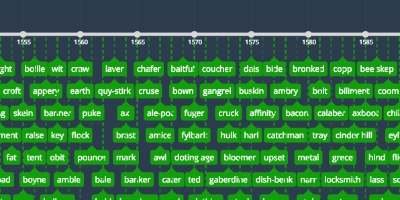jan 1, 1532 - yeoman
Description:
A word on record from <i>c</i>.1300 (OED), recorded later in Yorkshire: 1416 <i>Willelmus Fulshagh, yoman</i>, York (SS96/125). During that early period, and even into the sixteenth century, a yeoman was a man servant in the house of a person of higher rank, not an independent holder of a small landed estate: 1419 <i>Item lego cuilibet servienti meo vocato yoman vjs viijd</i>, Halsham (SS4/396); 1498 <i>to every yeoman of the seid Sir William Calverley to by them a bowe ijs,</i> Calverley (SS53/159); 1508 <i>I woll that ... all my houshold yomen have mete and drynke a quarter of a yere next after my decesse and ther hole yeres wages</i>, Clifton (SS53/276). It developed certain attributive uses: 1532 <i>Grant ... to George Coottes of Rascall, Yeoman, every weike whiett leveray loves, xij ... also of yoman aile of the great fatt v gallons,</i> Rievaulx Abbey (SS83/335). The ‘livery loaves’ are referred to elsewhere as ‘yeoman bread’: 1430 <i>8 panes secundarios vocatos yhomanbreed</i>, Selby (OED). See youngman.Added to timeline:
Date:
jan 1, 1532
Now
~ 493 years ago
